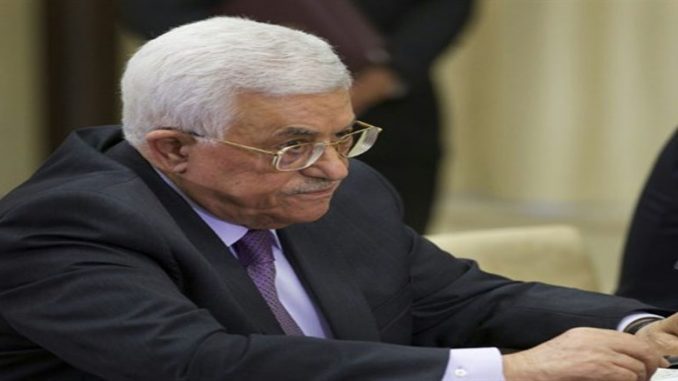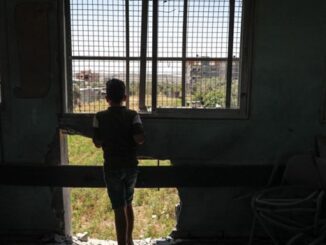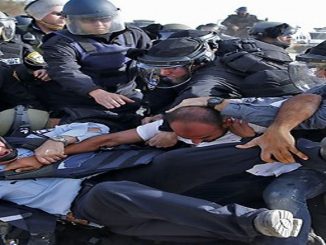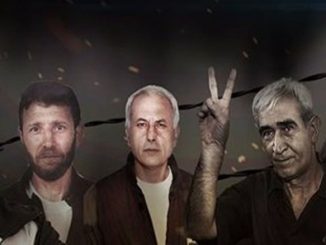
Palestinian President Mahmoud Abbas said Friday night that he decided to suspend all contacts with Israel until the latter lifts recent security measures against occupied East Jerusalem and the Al-Aqsa Mosque, though unconfirmed reports suggested that the decision would not include the cessation of security coordination with Israel — a primary reason for Abbas’ growing unpopularity.
Abbas cut a diplomatic visit to China short this week as tensions escalated in Jerusalem, and headed a joint meeting for the Palestine Liberation Organization (PLO) and Fatah Central Committee to discuss strategy in confronting the Israeli measures, Palestinian Authority-owned Wafa news agency reported.
In the wake of a deadly shoot-out between Palestinian assailants and Israeli police officers on July 14, Israeli forces shut down the Al-Aqsa compound for two days, only to reopen it after having installed security cameras, metal detectors, and turnstiles at the entrances of the compound.
Palestinians have said is the latest instance of Israeli authorities using Israeli-Palestinian violence as a means of furthering control over important sites in the occupied Palestinian territory and normalizing repressive measures against Palestinians.
Palestinians have protested the measures by praying outside of Al-Aqsa’s gates, with mass demonstrations across the occupied territory on Friday erupting into violent clashes that left three protesters killed.
“In the name of the Palestinian leadership, I declare the suspension of all contacts with the occupying country on all levels until Israel revokes all its measures against our Palestinian people and Jerusalem, particularly at Al-Aqsa Mosque, and preserve the historic status quo at Al-Aqsa Mosque,” Abbas said at the end of the meeting held in the central occupied West Bank city of Ramallah.
“We also reject the so-called electronic gates because they are a political move hiding under the cover of an imaginary security pretext that aims to control Al-Aqsa Mosque and evade the peace process as well as turn the conflict from a political one to a religious conflict,” he added.
According to Wafa, Abbas said that he has allocated $25 million “to help the steadfastness of the Palestinians in occupied East Jerusalem,” though it was not clear from the report exactly how these funds would be used.
The Palestinian president also called for a meeting of the Palestinian Central Council, a PLO policy-making entity, to discuss steps to protect the Palestinian national project and the Palestinian right to self determination and statehood, Wafa wrote.
Abbas also called on the Palestinian political factions, particularly Hamas, to work toward unifying the Palestinian people and turn the struggle toward Jerusalem and Al-Aqsa Mosque.
He also reiterated his demand that Hamas dissolve its“administrative committee” ruling the Gaza Strip and “allow the reconciliation government to take control of the Gaza Strip that would lead to national elections,” Wafa wrote.
Hamas reportedly said Abbas’s announcement to severe relations with Israel “are meaningless without the lifting of the restrictions on Gaza, stopping security coordination (with Israel), and an end to reigning in the resistance to the occupation.”
Onlookers also reacted with skepticism to Abbas’ decision to cut ties with Israel, given the PA’s widely condemned policy of security coordination with Israeli forces and the PA’s lack of economic independence due to various tax and trade agreements with Israel.
Israeli media sites and commentators on social media cited official Palestinian sources as saying Abbas’ move would not include the cessation of security coordination, which has been denounced as a revolving door policy of funneling Palestinian activists from PA jails to Israeli prisons — primary reason for growing anti-Abbas sentiment among Palestinians.
A recent public opinion poll conducted by the Palestinian Center for Policy and Survey Research showed that 62 percent of the Palestinian public want president Abbas to resign — 55 percent of people in the West Bank and 75 percent of people in the Gaza Strip.
The poll also documented widespread public rejection of the PA’s decision to reduce salary payments to its Gazan employees and to suspend payment to cover the cost of Israeli-supplied electricity to the Gaza Strip, which has plunged the besieged coastal enclave into an unprecedented humanitarian crisis. An near total consensus rejected pressure on the PA to terminate payments to Palestinian prisoners.



